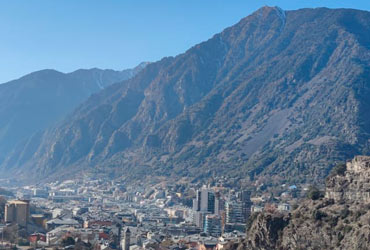In the heart of the Pyrenees, sharing borders with Spain and France, lies Andorra, one of the smallest countries in the world. Its area is only 468 km2, but it has managed to preserve its autonomy. One of the recurring questions when talking about Andorra is whether it belongs to Spain or France. Let’s quickly find out: Andorra is an independent country, often described as “a little jewel in the mountains”.
Contents:
1.- Andorra, the only co-principality in the world
Many people do not know that Andorra is the only country in the world whose parliamentary regime is that of a co-principality, and is almost 800 years old. As a result, Andorra has managed to preserve its neutrality and independence, and to remain a sovereign country.
The co-principality was established in Andorra in 1278 by means of the First Paréage between the Bishop of La Seu d’Urgell and the Count of Foix. Under this agreement these two would be “co-lords of Andorra” and a regime of co-sovereignty was introduced, putting an end to their continual disputes over the control of the territory.
Since then, Andorra has been an independent country, separate from Spain and France. The current heads of state (the co-princes) are Emmanuel Macron, President of the French Republic (who for historical reasons inherited the title from the Count of Foix) and the Bishop of La Seu d’Urgell, Joan Enric Vives.
Xavier Espot Zamora is current president of the Government (with the most executive power), while legislative power is vested in the Consell General (the Andorran parliament).
The adoption of the Andorran constitution on 14th March, 1993, declared the Andorran people the sole sovereigns of the state.
2.- Other peculiarities of the Principality
Andorra never ceases to amaze you. Perhaps this is the reason why more and more people are deciding to make this small country their place of residence.
Here are some interesting facts which you may not know:
- Andorra has 100 % optic fibre coverage, even in small villages or areas with very few inhabitants.
- The average age of the population is below 40 − 5 years of age to be precise, well below the average for European countries.
- Less than half of the inhabitants are Andorran. Most of the others come from Spain, Portugal and France.
- Andorra has never been at war (it has no army). It is also one of the safest countries in the world, with one of the lowest crime rates.
- Andorra is not part of the European Union, EFTA or the Eurozone, and although it uses the euro (Andorra does not have its own currency bank) the country is not technically part of the Eurozone. But it does enjoy special arrangements, and is no longer considered a tax haven.
- Andorra has the best healthcare system in the world, according to a report by the Institute for Health Metrics and Evaluation at the University of Washington (USA), published in 2017 by the medical journal The Lancet. The report showed data from 195 countries between 1990 and 2015, with five-yearly assessments. Andorra’s healthcare system topped the world ranking in all assessments, from the 85 points obtained in 1990 to the 95 in 2015, when Iceland scored 94 points, Switzerland 92, Spain 90 and France 88.
- Ten per cent of the Andorran territory has constituted a World Heritage Site since 2004, when UNESCO declared the Vall del Madriu-Pedrafita-Claror park a World Heritage Site in the Cultural Landscape category.
- Andorra’s parliament is the smallest in Europe and one of the oldest. Its origins date back to 1419, when it was called the Consell de la Terra (Council of the Land). It currently has 28 members, although it could have a maximum of 42. Half of the members are always elected by parish constituency, and half by national constituency.
- Andorra is the only country in the world whose only official language is Catalan. However, the vast majority of its inhabitants are bilingual (Catalan – Spanish) and even trilingual (Catalan – Spanish – French).
- Here you will find one of the largest collections of Bibles in the world, with almost 1,300 copies of Bibles translated into over a thousand different languages. Andorra can also boast that it is one of the countries with the largest number of museums per square kilometre.
3.- Requirements for living in Andorra
- Since the 1970s, Andorra has aroused great interest as a country of residence among those looking for work and good job opportunities. In recent decades, tax reforms and agreements to avoid double taxation have increased interest in residing in the country among entrepreneurs, sportspeople, ‘youtubers’ and other groups with high purchasing power.
In Andorra it is possible to apply for fiscal residence (non-profitmaking and not linked to an economic activity) or for residence with a work permit. Broadly speaking, to apply for residence in Andorra, the applicant must:
- Be of legal age.
- Prove a minimum period of stay in the country, ranging from 90 to 183 days (the minimum period of stay will depend on the type of residence applied for).
- Present a medical report.
- Have a place of residence, owned or rented.
- Present a criminal record certificate and a valid passport.
- Depending on the type of residence requested, deposit between €15,000-50,000 , which will be returned in full when the person decides to leave the country (provided there are no outstanding debts).
If you are interested in finding out more about applying for residence in Andorra, continue reading:
4.- Andorra and the European Union
Although Andorra has not been a member of the European Union since the 1990s, it has signed a number of agreements to maintain close and co-operative relations with the European Union. Some of those signed since 1990 are:
- The trade agreement with the European Economic Community, signed in 1990.
- The agreement on taxation of income from savings, signed in 2004.
- The monetary agreement, signed on 29th June, 2011.
- The agreement on the automatic exchange of information about financial accounts, to improve international tax accounting, signed in 2016.
Study the main legislative changes for foreign investment in Andorra.
5.- An attractive country for foreign investors
Whereas the global economic situation in 2020 put a brake on the volume of foreign investment in the country, the first half of 2021 is breaking new ground. Projects that were stalled last year have been approved in the first half of 2021.
The result: an extraordinary growth in the overall figure for this year, which was ten times greater than that of the first half of last year.
Spain leads in direct foreign investment in Andorra, accounting for 51% of the total in the first half of 2021 (compared with 44% in 2019). In second place is France with 26% of the total.
For more details about the explosive increase in foreign investment in Andorra in the first half of 2021, you can consult our latest blog at this link.
Andorra is a sovereign country that belongs neither to Spain nor to France. Its attractive tax regime and the quality of life in the mountains have made it a very appealing country to live in all year round.
If you are planning to apply for residence in Andorra or to transfer your business or company, don’t hesitate to contact us. We will help you through all the procedures to make the process quicker and easier.



